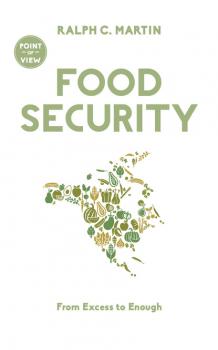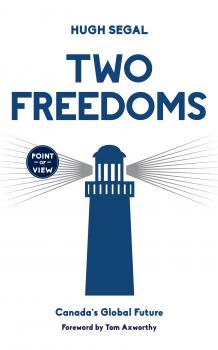ТОП просматриваемых книг сайта:
Point of View
Скачать книги из серии Point of ViewАннотация
Canadians are failing to balance reasonable food consumption with sufficient and sustainable production. The modern agricultural system is producing more and more food. Too much food. The cost is enormous: excess nutrients are contaminating the air and water; soil is being depleted; species loss is plunging us toward the sixth extinction; and farmers, racking up debt, are increasingly vulnerable to economic and climatic shifts. At the same time, people are consuming too much food. Two-thirds of health-care costs in Canada can be attributed to chronic diseases associated with unhealthy eating. And then there is the waste – householders, food processors, distributors, wholesalers, and retailers collectively waste 40 percent of the food produced. A radical rethink is required. We need to move from excess to enough.
Аннотация
John Boyko is the bestselling author of six books addressing Canada’s history and politics and a regular op. ed. contributor to newspapers across Canada While addressing a serious theme, the book sparkles with intriguing stories, fascinating characters, and in its many digressions, terrific humour Because Canada’s strength is its constant voyage of self-discovery and re-invention, the book’s value is its fresh perspective that will please some and antagonise others, while entertaining and challenging all Brings history, politics, power, and philosophy into a narrative bristling with sharp analysis and perspective sure to spark debate The book’s fundamental question is whether the Canada we enjoy today, so firmly resting on the foundation of yesterday’s triumphs and tragedies, is true to the vision of its founders and especially that of its primary architect and first prime minister, Sir John A. Macdonald
Аннотация
Defence expert Kim Richard Nossal presents a damning indictment of defence procurement in Canada, and shows how to fix it. Defence procurement in Canada is a mess. New equipment is desperately needed for the Canadian Armed Forces, but most projects are behind schedule, over budget, or both. Not only has mismanagement cost Canadian taxpayers hundreds of millions of dollars, it has also deprived Canada and the CAF of much-needed military capacity. Successive governments – both Liberal and Conservative – have managed the complexities of defence procurement so poorly that it will take years before the Royal Canadian Navy, the Royal Canadian Air Force, and the Canadian Army regain the capabilities they need. While new prime ministers invariably come to power promising to fix problems inherited from their predecessors, getting it right has remained frustratingly elusive. Charlie Foxtrot offers a fresh take on this important policy issue. It shows why governments have found it so difficult to equip the CAF efficiently, and offers a set of political prescriptions for fixing defence procurement in Canada.
Информация о книге
Автор произведения Kim Richard Nossal
Жанр Прочая образовательная литература
Серия Point of View
Аннотация
This special 2-book bundle contains two cutting edge pieces of political analysis. Irresponsible Government examines the current state of Canadian democracy in contrast to the founding principles of responsible government established by the Fathers of Confederation. The book examines the failure of modern elected representatives to perform their constitutionally mandated duty to hold the prime minister and his cabinet to account. It further examines the modern lack of separation between the executive and legislative branches of government and the disregard with which the executive views Parliament. The book seeks to shine light on the current power imbalances that have developed in Canadian government. There are few greater tragedies than a war waged by a society against itself. As Time Bomb shows, a catastrophic confrontation between Canada’s so-called «settler» and First Nations communities is not only feasible, it is, in theory, inevitable. Grievances, prejudice, and other factors all combine to make the likelihood of a First Nations uprising very real. This book describes how a nationwide insurgency could unfold, how the «usual» police and military reactions to First Nations protests would only worsen such a situation, and how, on the other hand, innovative policies might defuse the smouldering time bomb in our midst. The question all Canadians and First Nations must answer is this: Must we all suffer the disaster of a great national insurgency or will we act together to extinguish the growing danger in our midst? Includes Irresponsible Government Time Bomb
Аннотация
Nearing the end of a lifetime in the boreal forest, a retired forester writes a passionate plea for rational, science-based forest management. The boreal forest is constantly changing, often dramatically. We like to picture it as a stable, balanced system. Really, it is anything but stable. The boreal forest is dynamic. For over sixty years, forester Malcolm F. Squires has seen mature forests within protected areas devastated by insects, moose, wind, and wildfire. While the forests often return from this destruction, they are never quite the same. A naturally balanced boreal forest is a human notion that does not match the reality of nature. If we don’t soon recognize and accept that reality and stop making irrational demands that a forest be “protected” from change or human management, we may be dooming them to disaster.
Аннотация
The Hill Times: Best Books of 2016 A bold call for a Canadian foreign policy that advances the basic freedoms that enable peace, stability, development, and security. What ends should a democratic country’s foreign policy serve? Avoiding diplomatic disputes? Keeping allies happy? Promoting national and global security? While a qualified yes is the logical answer to all of these secondary questions, Two Freedoms argues for something more, something that reflects Canada’s commitment, at home and abroad, to the two key freedoms: freedom from want and freedom from fear. Two Freedoms examines the costs of allowing these freedoms to die or diminish and at how a country can design a foreign policy that makes the pursuit of these freedoms real and practical. To design a genuine foreign policy of purpose and substance, a country must look at what it would mean for its diplomats, its military, its development aid, and its relations with important multilateral organizations like the U.N. To achieve a goal, a foreign policy needs good strategy, tactics, and design. These key elements are all found in Two Freedoms .
Аннотация
An in-depth breakdown of the recent wave of Canadian Senate scandals, highlighting the need for abolition. The Senate of Canada was created as a temporary expedient at the time of Confederation, offered as part of the negotiations to bring Canada’s original colonial provinces into the new political union in the mid-1860s. Since then, the original provinces with upper houses abolished them. New provinces were created without second chambers to their legislatures. Only the Parliament of Canada remains stuck with its redundant and irrelevant colonial relic, costly to maintain and out of step with the values of a modern democratic country. Today, the Senate of Canada is rocked by ongoing scandal. News of this far-reaching scandal rightly disturbs Canadians, but the real national scandal is the very existence of the Senate itself.







